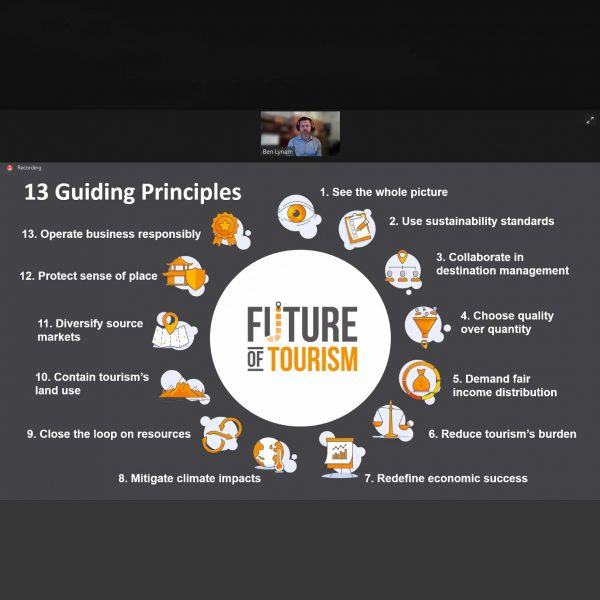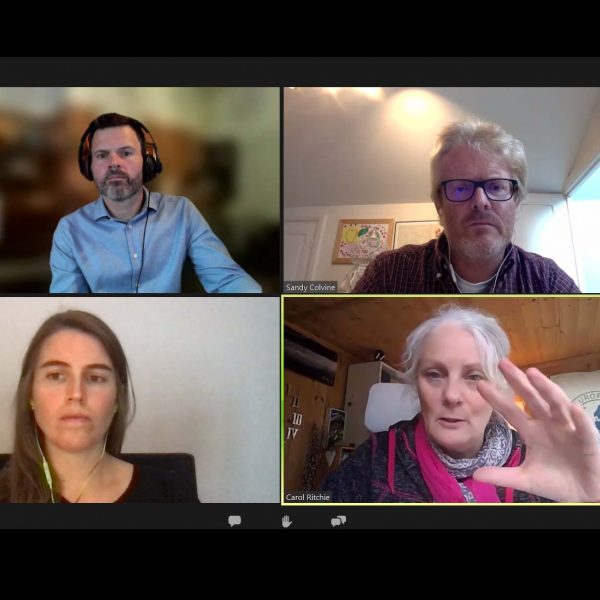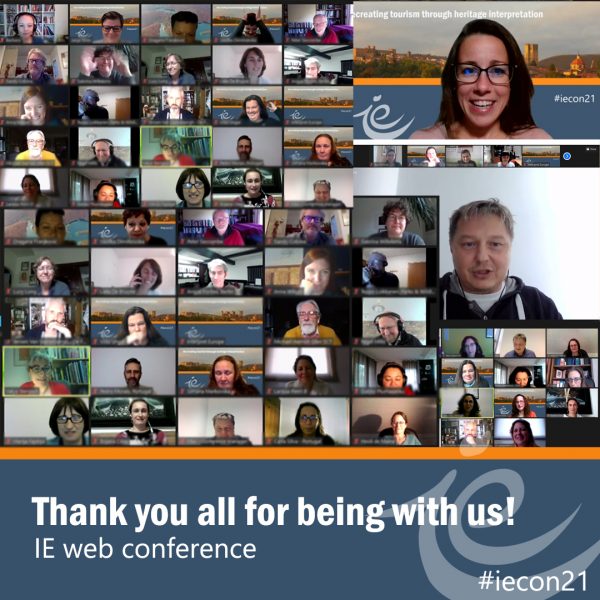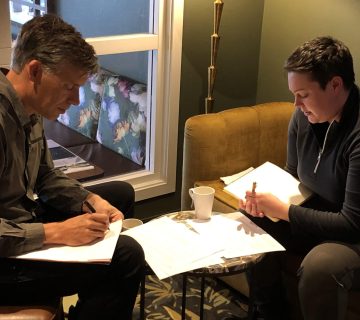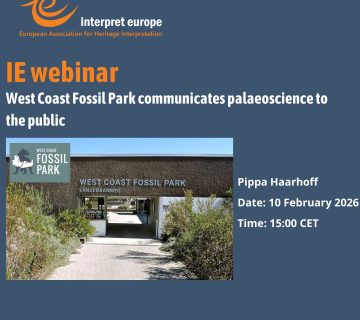For the second year, IE’s annual conference brought people together virtually – this time to discuss recreating tourism through HI.
We were very sad not to be able to come together in person in Spain as planned for #iecon21, but conference manager Max Dubravko Fijacko and the team worked so hard to bring together another excellent online event, featuring four keynotes, a special guest workshop, panel debates, 27 presentations from participants and a host of ways to interact with each other and share project experience, including an ‘open doors’ session for the tourism sector. If you didn’t join us online this year – or if you need a reminder of everything that happened – Sandy Colvine, Chair of the IE Supervisory Committee, shares with us his wrap-up of the event (which can also be found in the conference proceedings), followed by some thoughts from some participants for whom iecon21 was their first interaction with Interpret Europe.
We met virtually because of the C-word but somewhat surprisingly and refreshingly, the C-word pretty much took a backseat at our conference. While it is still influencing our lives to varying degrees, I take this as an indicator that we are finding our way out of this mess and upheaval and that soon we’ll return to our normal which is seeing each other face to face. I sense we are all a bit fatigued and jaded by Zoom, Microsoft Teams and other platforms, and the novelty has worn off especially as we begin to emerge from this paralysis.
So firstly, I want to say a huge thank you to everyone who participated for stirring your energy and enthusiasm to join us and contribute so impressively to our conference, both in its content and your participation. Secondly, I would like to give a big thank you to Helena Vičič, Max Dubravko Fijacko and all the members of the events team, both the visible ones and those behind the scenes. It was an immense amount of work but ably assisted by our sponsor and supporter, MUZE, which wasn’t just a logo but an active contributor to the conference, so many thanks for that to Dragana Lucija Ratković Aydemir and her team of muzes.
Thank you also to our day hosts and session chairs for their carefully crafted insights and transitions from one presentation to the next. And also to Athina Tsekoura, Ivana Jagic and Max (again) for providing evening entertainment so that we could let our hair down at the end of the day and have a laugh and even share a cocktail.
I think there was much to be enthusiastic and ambitious about with the discussions, exchanges, ideas and experiences.
Day one threw us into new models, new trends and paradigms of a more mindful, responsible form of tourism, posing the big questions about where we are going, partly fuelled by the public health crisis. But in all these difficulties the driver for change is something we know is true, story-sharing as Michael Glen coined it. And if we share, we care. Indeed, one of our presenters said, “interpretation makes the world a better place” and so does food, which is a key carrier of heritage that was very much present on Day one with the Gastronomic Heritage Team.
On Day two, we turned our focus to people and communities, resilient communities. Ben Lynam, our keynote that day, said, “heritage is the essence of the destination”. To complement that, I would dare to say that interpretation is the essence of the visitor experience providing the authenticity and sense of purpose that people still desire and increasingly so, as we heard from Iulia Niculica the day before in her keynote.
Day three shone a light on how we can pin down this challenging term, sustainability, with certification schemes and the shift from bums on seats (numbers) to quality of the experience. We learned loud and clear that people are a fundamental, we forget them at our peril. People are heritage, heritage is people, as our panel discussion with the wandering Bernard Lane reminded us and most crucially on Day four, as Gianna Moscardo told us, stories are the one thing that only people have and while sustainability for visitors may be a distant horizon, sharing the love of place and what makes it special through a story already starts that thought process to considering how a site relates to our behaviour as global citizens.
So, as we learned, people, or communities, are an essential element in developing sustainable tourism, but also ownership of tourism products and installations and maintaining them and even becoming guides to visitors, providing this so sought-after authenticity.
As some attendees pointed out, giving us a provocative prod, mass tourism isn’t necessarily bad in certain situations. Why is a beach viewed dimly compared to a forest or a mountain? But of course it can be better. The worst sides of hundreds of people suddenly descending on a coral reef or a small fjord town really don’t benefit local communities or visitors and in many cases just create conflict and damage.
However, as we learned, “visitors start seeing things when they know things”, as not everything is immediately visible. But then again, not everyone says the right things as tourism providers which I thought touches on the ‘irresponsibility’ that was alluded to in tourism agencies publishing attractive pictures for social media and fuelling over-tourism.
Yet when there is interpretation to Discover, Appreciate and Respect we get a GIFT in Romanian, which I thought was a delightful expression. And that’s what we, the interpretive community has, a gift to share and give.
The participatory dimension in the contributions from attendees was very strong. There were plenty of examples about developing local tourism projects that interest and involve local communities rather than top-down processes that often ignore them or treat them improperly. It’s this rebalancing that presents a fertile ground for interpretation to complement this process. As we saw, community involvement leads to far greater chances of tourism initiatives that are sustainable over time as well as in their social, economic and environmental dimensions, and I think this is so important when grant aid that often kickstarts them in the first place comes to an end.
It was great to see familiar faces sharing their knowledge and experiences but also hugely encouraging to see so many new faces from new countries and organisations, introducing us to their work, providing concrete examples of interpretation and pushing boundaries, even international ones like the inspiring networking efforts of our Portuguese friends to propagate the interpretive approach.
Speaking of things international, Michael Glen and Gianna Moscardo reminded us about the old adage, “think globally, act locally” teasing out and connecting with global issues from a single site or phenomenon. I think that also applies to us pushing for interpretation to be part of a strategic approach to reshaping tourism, such as through alliances as well as really important grass roots localised and regional actions. Apart from a few cases, most notably the heartening progress made in the Czech Republic, interpretation has habitually been an afterthought, a bolt-on, in the planning process but we can’t continue to let that happen. We have plenty of energy as has been demonstrated in all the projects and presentations and it’s up to organisations like IE to harness this energy, not let it dissipate. I think, as we heard from our keynotes, we have a role to play at the forefront of new responsible, mindful sustainable forms of tourism where authenticity matters.
I heard the word passion many times during the conference, passionate communities, passionate interpreters, That’s not so surprising as we’re passionate about what we do but we also do it with expertise. Passion + expertise, we need both to convince: passion to craft new tourism experiences plus our expertise as interpreters promoting themes to expose people to deeper meanings.
We live in a world where the vocabulary and messages are increasingly stark: Climate change is now climate crisis. It’s alarming, the problem is serious, but it can overwhelm people. As we heard in our keynote on day four, we shouldn’t be part of any guilt-focused approach to reprimand people with but bring hope and inspirational stories to encourage them to be more responsible, mindful and sustainably-minded by giving them, as Thorsten Ludwig said, the mind space for this to happen.
So, returning to our theme, recreating tourism through heritage interpretation, I really believe from what I have heard, we do merit our place at the table, through our passion and expertise we bring as interpreters. From that slightly euphoric statement, if we are to act on our intentions, we also need to be pragmatic to make this happen so that our voice is heard and I would like us in this nascent post-Covid period to step up our work and support IE and its peer organisations and partners to make this happen, so that it is not just words, that we can influence consultations and really make a change. I’ve worked for a number of small NGOs doing great things in environment and heritage but that remained small voices with limited influence.
I’d like to see all this hard work that goes into our conference themes come to fruition in the time that it takes and engaging with agencies and authorities. I know we’ve got limited resources and most of our achievements come from voluntary efforts, so we need to play our cards wisely to get interpretation acknowledged for the value it brings, just as we did over the last few years with the European Commission.
So, what really needs to happen to ensure the development of a more mindful, responsible and sustainable form of tourism is that our voice is heard and that we make a persuasive argument to be a contributor to this process as we “build back”, to use a well-worn C-word related expression.
Thank you so much to everyone who participated for your time and your contributions that have brought life to our conference. It’s hugely appreciated and I hope that next year we can all meet face to face with all the excitement and enthusiasm that that will undoubtedly generate.
Sandy Colvine is the Chair of IE’s Supervisory Committee. He can be contacted at: alexander.colvine@interpret-europe.net.
Some thoughts from other participants
The conference was wonderful! I came away with many ideas and insights. I am struck by how there seems to be such an overlap with interpretation and tourism, much more than what I see in the US. I also appreciated being able to meet so many different people and to hear about projects that are happening around Europe. Some of those seem like they would be good models to follow. I have much to learn!
I found the conference well organised and the technology very easy to use. Although I would have enjoyed attending the conference in-person, having it virtual meant that I could be involved in it from much further away.
Lucy Long directs the independent non-profit Center for Food and Culture (www.foodandculture.org) and teaches at Bowling Green State University in Ohio, USA. She holds degrees in Folklore and Ethnomusicology, and certification from the US National Association for Interpretation (NAI). She has published widely on food, culture and folklore and is currently conducting a virtual oral history on Finding Comfort/Discomfort Through Foodways During the Covid-19 Pandemic. Lucy presented a session called Disgust is in the mouth of the beholder: Using distasteful foods to interpret culture.
It was a wonderful experience to attend the conference. Some of the main things that struck me: There was a total synergy between the team, host, presenters, exponents that exceed my expectations. Criteria were well presented, documented and argued for, not only through theory, but in the immense volume of materials and examples that were shared – and that we were motivated to look for more. You could feel how the team was focused on the details, they integrated their efforts in a common success. This conference experience let every cultural heritage professional find the spark or engine to continue developing their vocation; it was the perfect convergence of amazing professionals in the cultural heritage sector around the world, looking for excellence in their performances as professionals, not only for quality but for sustainability of the environment, people and resources found in every country.
Larissa Pietri is an economist and is passionate about history and art. Having worked in South America, she now lives in Valencia, Spain, and is looking for a position in the cultural heritage sector. She can be contacted at: larissapietri@yahoo.com.
It was an honour to join other professionals in the tourism space to discuss resilient communities and sustainable tourism development. A common insight throughout the panel was to focus on providing platforms for local voices and leaders in the conversations around developing tourism destinations or attractions. I’m looking forward to the next event with Interpret Europe to build further on these ideas.
Jane Connelly holds an MSc in Innovation in Tourism Management of Culinary Heritage and is a consultant in the USA with a wealth of experience in food tourism. She is passionate about and inspired by food heritage and culinary experiences, identifying them as engines for sustainable economic development and preservation of culture. Jane joined us as a panellist for one of the debates. She can be contacted at: hello@janeconnelly.com.
To cite this article: Colvine, Sandy, (2021) ‘iecon online’ in Interpret Europe Newsletter 3-2021, 7-10.
Available online: https://interpret-europe.net/wp-content/uploads/2021/10/Newsletter-Autumn-2021.pdf

